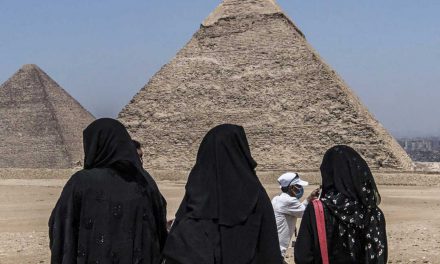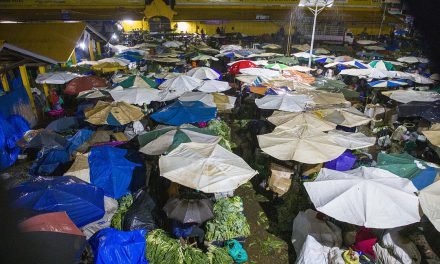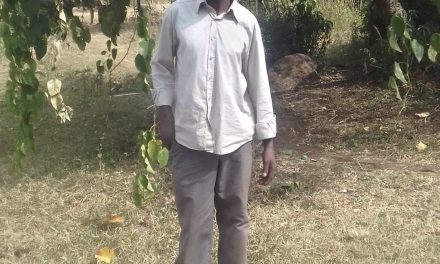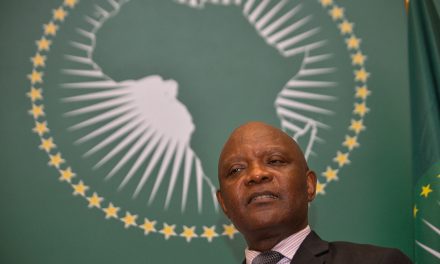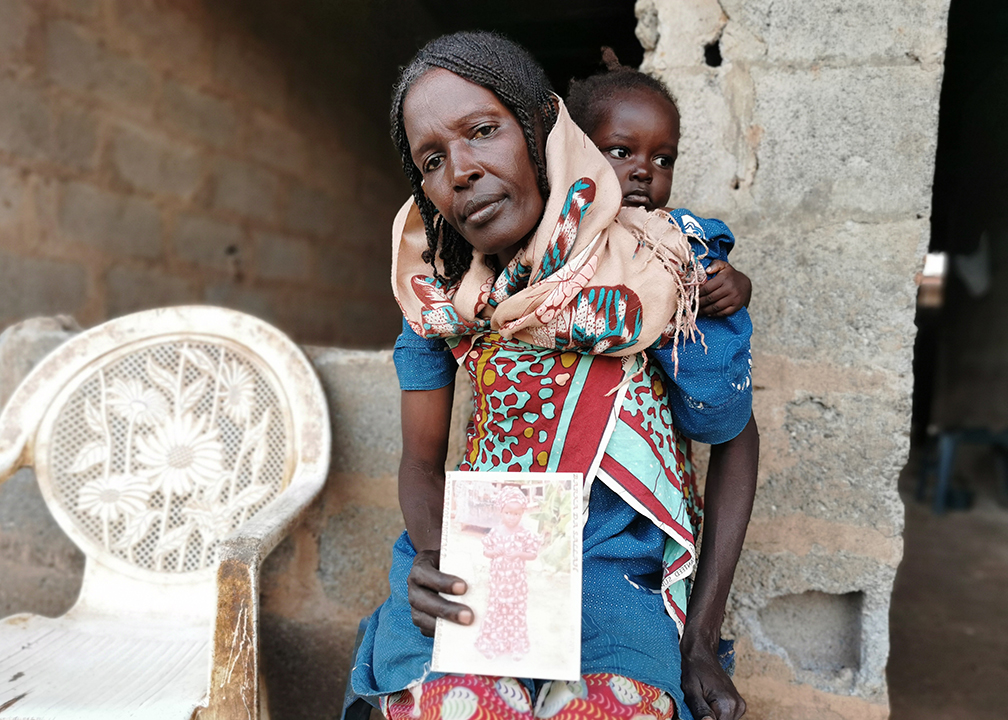
Falmata Haruna holds a picture of her eight-year-old daughter, Ketu, who died in one of Nigeria’s internally displaced people’s camps during the pandemic. Photo: Dorothy Asi
Eight-year-old Kelu was ill for most of the COVID-19 pandemic and lockdown in 2020. Her family relocated to the Malaysia Gardens Internally Displaced Persons (IDP) camp in Nigeria’s Federal Capital Territory (FCT), Abuja, in 2016. They had fled Boko Haram attacks in their home village of Gulumba, Borno State, north-east Nigeria. Her mother, Falmata Haruna, earns N500 (about $1.20) a day when she can find work as a hired farmhand, and is often not paid on time.
Falmata’s husband, Haruna, earns N15,000 (about $36) monthly as a night watchman at a local market. Falmata told Africa in Fact that, “Kelu complained about stomach pain and headaches just before the lockdown. Her father had to borrow money for hospital. We went to Shadalafiya Hospital, Kabusa and Shekwoyisa Maternity and Nursing Home Care Hospital, Wauro. But the medicines they gave didn’t help.”
Next, they went to Asokoro General Hospital, one of Abuja’s biggest and best equipped government hospitals. But it had been turned into a COVID-19 treatment centre and they were referred instead to the National Hospital in Abuja. Instead, they went home because they had no money. Desperate, Haruna borrowed more money, and they were able to have their daughter treated at the National Hospital.
“They had barely finished her first round of paid tests when we were told she had died,” a tearful Haruna says.Since 2009, the militant Islamist group Boko Haram has devastated north-east Nigeria, forcing families like Haruna’s to flee to other parts of the country. The militant group has killed many male heads of households and forcefully recruited others, or held them captive. Women and children have been used as suicide bombers and sex slaves or forced into marriage with the insurgents. As with so many crisis situations, this has left women as breadwinners and forced them to flee to safety.
The United Nations Refugee Agency (UNHCR), in a February 2021 appeal for IDPs, said, “COVID-19 containment measures have disproportionately impacted refugees and forcibly displaced people, 85% of whom are hosted in low- and middle-income countries.” According to the UNHCR, some of the ripple effects of the pandemic on people like Haruna and her family are “lost livelihoods, spiralling poverty, destitution, and insufficient aid and development.”On 31 May, 2020, Nigeria’s Operational Humanitarian Country Team (OHCT) released its Joint Support Framework.
The goal was to ensure a coordinated approach to managing the COVID-19 emergency in the country across partners and sectors. The strategic objectives of the framework directly align with those of the COVID-19 Global Humanitarian Response Plan (GHRP). This plan, among other COVID-19 goals, aims to protect, assist and advocate for refugees, internally displaced people, migrants, and host communities particularly vulnerable to the pandemic.
While this seems well-thought out, Amina Mohammed, another Malaysia Gardens camp resident who fled from Bulakuli, Borno State, said the government’s COVID-19 efforts had not made any difference to their lives. “Nobody even came to sensitise us about the pandemic or distribute palliatives here,” Mohammed told Africa in Fact. While maternal and child health were the most pressing challenges for internally displaced women at Malaysia Gardens, for women at another IDP camp, Gongola, respecting the COVID-19 guidelines remains a luxury, especially washing their hands under running water for 20 seconds.
Asmau Yusuf, an IDP who fled her home in Adamawa State in Nigeria’s north-east, scoffed, “My children don’t even know what a tap looks like let alone one with running water, because we don’t have them here.”Along with other women, Yusuf, with her eight-month-old, Saratu, strapped to her back, fetches water – for chores and bathing – from a stream about 30 minutes’ walk from the camp and back at least seven times daily. The women rely on a commercial borehole in the camp for cooking and drinking water, for which they pay N20 for 10 litres. Prior to the pandemic, 10 litres of water cost N5 in the rainy season and N10 in the dry season.
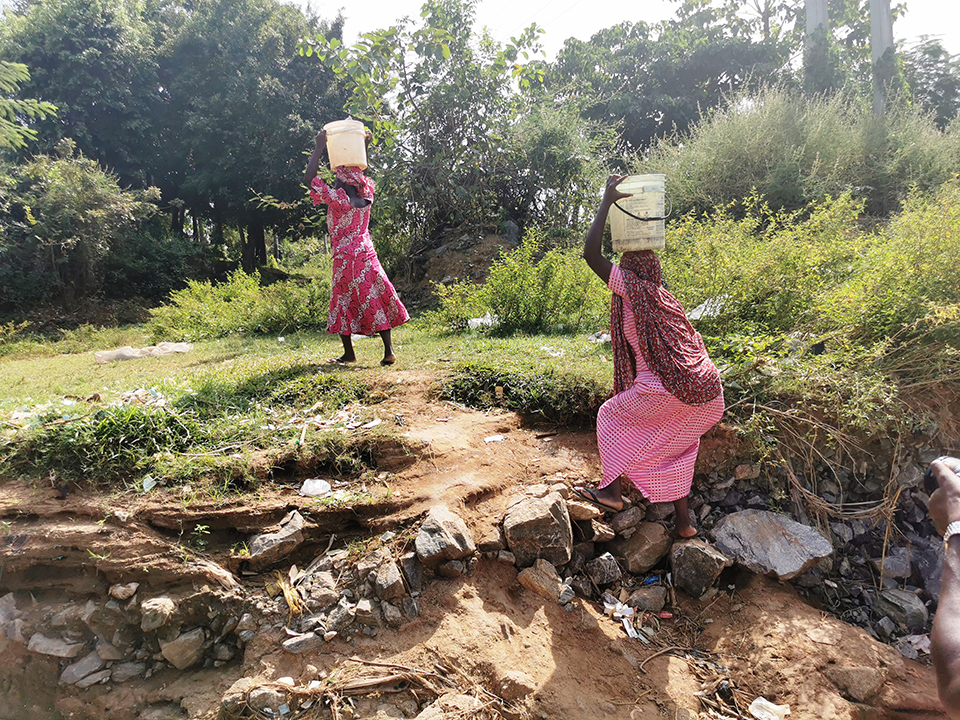
Asmau Yusuf, who fled her home in Adamawa State in Nigeria’s north-east for a camp for internally displaced persons, heads back home with a neighbour after fetching water, a half an hour’s journey from the camp. Photo: Dorothy Asi
Yusuf said the only COVID-19 interventions they had received from the government were food items early in the pandemic, and later in October last year. Some NGOs had distributed face masks and sanitisers. The pandemic had also affected how the women in Gongola camp were forced to manage menstrual hygiene. Mary Ayuba, who had also fled Adamawa, told Africa in Fact that they had gone back to mostly using whatever piece of cloth they could find during menstruation because so many women had lost their livelihoods during the pandemic and could no longer afford sanitary towels. “We have strips of fabrics which we use instead, to cut down costs,” Ayuba says.
While guidelines and rules are in place, the challenges raised by these women are details the authorities do not seem to have taken into consideration, as Dr John Agbo, a general medicine practitioner and medical director of Lona City Care Hospital in Karu, Abuja, explained. Agbo, who has also worked in the public health sector, told Africa in Fact that the attention given to IDPs during the pandemic was “sub-optimal”.
“First, the healthcare facilities in the camps that have them, are set up as emergency facilities and are therefore not equipped to cater to the needs of the pandemic. It was fortunate that the IDP camps didn’t have reported cases or, if there were, they were minimal. The spread would have been devastating because social distancing is not achievable the way the camps are set up.”
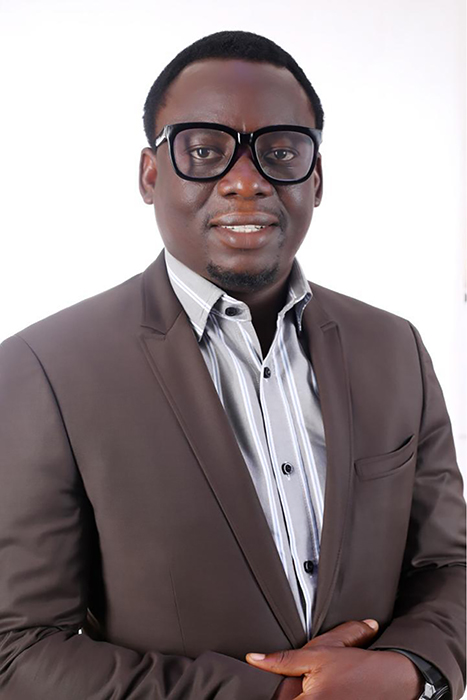
The Director of Lona City Care Hospital in Karu, Abuja, Dr John Agbo. Photo: Dr John Agbo
Meanwhile, the director general of the Federal Capital Territory Emergency Agency (FEMA), Abbas Idris, is on record as asking IDPs to be grateful. He told journalists that they had “the penchant and attitude of some so-called internally displaced persons (IDPs) in the Federal Capital Territory (FCT) to accuse government of neglect.”
This was in response to Kuchigoro IDP camp chairman, Philemon Emmanuel, who had called Idris out for what he described as the “lack of government’s attention and support for the plight of IDPs living in the camp, especially during this COVID-19 period”. “I am particularly sad with claims by some people who call themselves IDPs at New Kuchigoro, that they have been abandoned by the Federal Government or the FCT, especially during this COVID-19 period,” Idris said.
Camp resident Mary Ayuba acknowledged that Kuchigoro might have benefited from FEMA’s efforts, but added, “That’s the cover government uses. Once they give [to] Kuchigoro and make a show of it, for them that means all IDPs in the FCT have been taken care of. More than COVID-19, we are suffering other health conditions that would not be the case if we had water, for instance.” While Haruna, Mohammed, Ayuba and other women like them pray that they will continue to escape the wrath of COVID-19, they call on government to wake up to the realities of their circumstances and make more sustainable changes beyond food deliveries.
For Ayuba, who was a successful farmer before she was forced to watch the insurgents burn down 35 bags of farm produce and her barn, nothing would beat returning to Adamawa, her ancestral land. But with the insurgency ongoing, the women are terrified to return to their homes, much as they would rather be there than in the FCT. They are also weary of government’s claims that the insurgents have been driven from their communities, especially with the added menace of kidnappings and banditry. It is imperative, therefore, that government acknowledges the reality of the added insecurity that COVID-19 has caused vulnerable communities like IDPs, and deal with it. Denial and insensitive comments just add to their desperation and despair.

